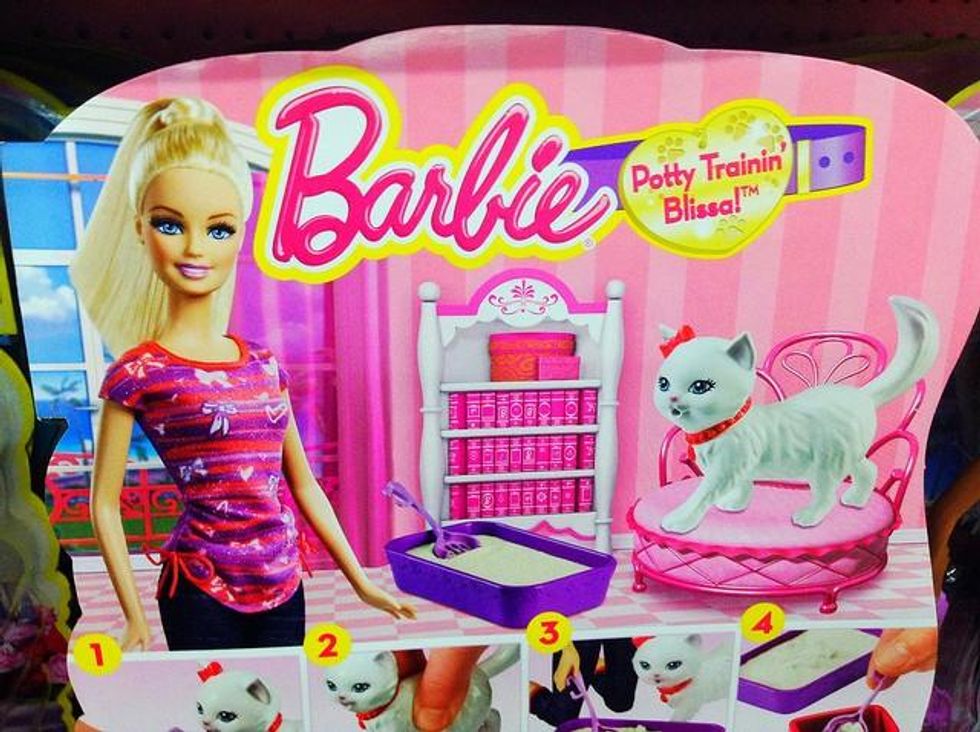We recently asked 37 girls in the US between the ages of four and seven to spend some time with a toy and then answer two questions: how many of 10 different jobs could you do when you grow up? And how many of these jobs could a boy do when he grows up?
The results of our study - the first of its kind to show how the iconic plastic blond bombshell can affect young girls' early ideas about their place in the world - are as sobering as they are indicative of the narrow ideal we offer to our daughters. After only five minutes of playing with Barbie, girls in our sample said that boys could do more jobs in the future than they could. Girls who played with Mrs Potato Head, on the other hand, responded that they could do about the same number of jobs as boys someday.
Barbie has long been popular, but she's been in the spotlight recently, from Mattel's controversial decision to partner with the Sports Illustrated swimsuit edition, to a call from the Campaign for a Commercial-Free Childhood for the Girl Scouts to end their partnership with the doll, to a crowd-sourcing fundraiser to market a realistically proportioned Barbie alternative. Barbie is an American cultural stalwart, but it's time we once again considered her impact - and that of toys in general - on the lives and identities of the young boys and girls who play with them.
Developmental science has shown that children are constantly learning, from the first hours of life, from every experience and every encounter. Even children at "play" are still actively taking in information and making sense of the world. So what kinds of meaning do they derive from playing with dolls like Barbie?
Barbie's message for girls is a narrow one. Mattel didn't partner with any of several initiatives to include girls and women in science, such as For Girls in Science or the White House initiative on women in STEM. Instead, they went "sexy" by choosing to partner with the SI swimsuit edition. This is, of course, consistent with an increasingly sexualized environment for girls and women: the American Psychological Association Task Force on the Sexualization of Girls has noted that social pressures focused on appearance - especially a thin and sexy appearance - can lead to depression, low self-esteem and eating disorders, all of which can have a negative impact on girls and work to limit their options in the future. And television, movies, magazines, advertising, music videos, video games and clothing, among others reinforce one message: that women and girls will be judged for how they look, not what they do.
These pressures aren't simply theoretical: scientific evidence shows that higher exposure to sexualized media is linked to depression, body dissatisfaction and self-sexualization, as girls internalize objectifying messages through repeated exposure over time. Self-sexualization leads girls to obsess over their bodies and appearance, which can result in impaired cognitive performance for college-age women. We don't yet fully understand how sexualization influences the well-being of girls, but there's no evidence so far to suggest that the impact could be positive.
The focus of our study was girls, but narrow gender socialization affects boys, too. Wander through any toy store and you'll find all the pink and purple toys and dolls in one aisle, while the dark blues, browns, trucks and weapons are in another. Just as girls are limited by their gender socialization, boys are limited by theirs. And in boys, the fear of being labeled a "sissy" can lead to aggression, risk-taking and homophobia. Bombarded by sexualized media portrayals of women, boys grow up learning to treat women as objects, which also makes them less satisfied in their adult romantic relationships.
Parents need to pay closer attention to the overt - as well as the unintended - messages that their children's toys carry, and the effect that these messages can have on the adults they will one day grow into. It's time we expanded what our children know, and by doing so, what they can become. Maybe it's time we even started listening to the tagline for one of those crowd-sourced Barbie alternatives - average can be beautiful - and then looked beyond average, too.
